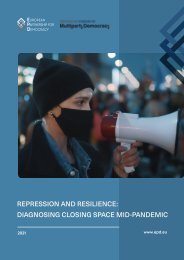Thinking Democratically: A Comprehensive Approach to Countering and Preventing Shrinking Space
Create successful ePaper yourself
Turn your PDF publications into a flip-book with our unique Google optimized e-Paper software.
levels of state capture. Finally, in Europe restrictions in civic space have become increasingly<br />
widespread, while some countries have also attacked the independence of the judiciary <strong>and</strong> spread<br />
polarising rhe<strong>to</strong>ric <strong>to</strong> limit democratic space.<br />
In addition, the case studies showed that closing space is different <strong>to</strong> different population groups. In<br />
particular, women, youth, or people belonging <strong>to</strong> minorities are disproportionately affected <strong>and</strong><br />
targeted by attacks <strong>to</strong> close democratic space. People with vulnerabilities resulting from<br />
intersectionalities are even more at risk. This means that people who are already facing different<br />
barriers <strong>to</strong> participate in decision making are even more affected <strong>and</strong> further excluded when<br />
democratic space is being closed. This has important implications for how <strong>to</strong> best support these<br />
underrepresented groups in a closing space context.<br />
Closing space is thus not a linear process, but a multi-layered non-sequential phenomenon affecting<br />
the whole political system. Progressive changes on one level can exist in parallel <strong>to</strong> regressive<br />
changes on another level, such as in the case of Georgia where improvements in the judiciary <strong>and</strong><br />
the rule of law, go h<strong>and</strong> in h<strong>and</strong> with attacks on political contestation. There is no clear sequence in<br />
these different strategies, even though attacks on civic space have in many cases been a precursor<br />
<strong>to</strong> reforms that strip the judiciary of its independence, <strong>and</strong> constitutional or elec<strong>to</strong>ral reform that<br />
limits democratic contestation.<br />
B. Gradual erosion through subtle attacks or a protection of the status quo<br />
While the term shrinking space has come <strong>to</strong> embody pro-active attacks on civic space such as<br />
restrictive laws or disruptions of protests, democratic space is also being restricted through more<br />
subtle, invisible <strong>and</strong> long-term actions. Just like V-Dem has identified that au<strong>to</strong>cratisation occurs in<br />
a very gradual manner, these case studies show that democratic space is being shrunk by a multitude<br />
of actions that are far more invisible, subtle <strong>and</strong> gradual at eroding the space for democratic<br />
contestation <strong>and</strong> decision-making. Authoritarian regimes learn <strong>and</strong> adapt <strong>to</strong> international trends <strong>and</strong><br />
criticism, for instance by refraining from overt attacks on civil society <strong>and</strong> employing other, more<br />
subtle means <strong>to</strong> repress democratic ac<strong>to</strong>rs.<br />
Where in some cases one can witness an active closing of democratic space (as in Kenya, Honduras,<br />
Georgia <strong>and</strong> Indonesia), other cases are marked by a proactive protection of a restrictive status quo<br />
(Guatemala <strong>and</strong> El Salvador). In such cases, the prevention of change, rather than any visible<br />
enforcement of change, gradually contributes <strong>to</strong> a closing of democratic space.<br />
Likewise, impunity has a major long-term impact on fundamental freedoms in practice, but it does<br />
not reach global attention without concerted civil society action on individual cases. Impunity has a<br />
chilling effect on civil society, media <strong>and</strong> political ac<strong>to</strong>rs, inducing fear of stepping in<strong>to</strong> the public<br />
<strong>and</strong> speaking out, be it against the government or criminal networks.<br />
This is clearly demonstrated in the case studies of Guatemala <strong>and</strong> El Salvador, where there is far less<br />
coordinated civil society pushback in the form of advocacy, public litigation or petitions, for instance.<br />
44

















